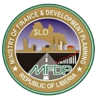Minister Tweah wants Increase in Development Assistance to Africa
Finance and Development Planning Minister Hon. Samuel D. Tweah Jr., has expressed the need for development and multilateral partners to increase the “Official Development Assistance (ODA), to Africa.
Official development assistance (ODA) is a category used by the Development Assistance Committee of the Organization for Economic Co-operation and Development to measure foreign aid.
The DAC adopted ODA as the “gold standard” of foreign aid in 1969 and it remains the main source of financing for development aid. It promotes and specifically targets the economic development and welfare of developing countries
Hon. Tweah spoke at the recently held United Nations Economic and Social Council (ECOSOC) Forum on Financing for Development.
According to him, Africa has received just 3.9 percent of Official Development Assistance (ODA) in the last six decades, despite being among the least developed regions of the world.
“In the last 60 years, more than USD 33 trillion in Official Development Assistance has been spent to date in the world. Africa’s share of this ODA spending is a mere 1.3 trillion or 3.9 percent. This begs the question which countries or regions of the world have been receiving the lion share of ODA since Sub-Saharan Africa is among the least developed regions in the world.” Hon. Tweah added.
Hon. Tweah indicated that the needed increase in ODA to Africa should form a part of a global framework that anticipates crisis and makes allocations for them even before they occur.
He said while the world cannot be certain of the exact timing of a pandemic or a financial crisis, the international multilateral system can make annual provisions for the occurrences of these phenomena to move away from the current practice of crisis response.
The global framework, he mentioned, should also consider moving towards pre-crisis multilateral resource allocation; and developing a more comprehensive framework for addressing private sector deficiencies in developing countries.
“Multilateral institutions should incorporate an expected crisis parameter in the formulas for determining allocation to countries under our current multilateral framework. Where crises do not happen in a given year or period, these resources can be used to solve crippling development challenges facing low-income counties. We welcome similar formulas from the International Monetary Fund through the SDR system. We also welcome the shortening of the World Bank’s IDA cycle to 2 years as a form of post-crisis response. But we believe these must be standardized and made a permanent feature of a global anticipatory financing or allocative framework. Countries are only as strong to confront global epidemics or pandemics as the resilience of their respective private sectors.
The world has still not grappled at the highest levels with the slow pace of global investment flows to Africa to close the large infrastructure deficit Africa faces. The post-pandemic order must aim to address these structural constraints to Africa’s private sector possibilities as the best response to any future pandemic on the continent. Africa is currently where Latin America was 40 years ago on a per capita income basis. This cannot and should not continue as part of the Post-COVID world order.” Tweah noted.
Also, he added that COVID-19 has shown that health epidemics that impose devastating impacts on human lives and economies make no distinction between developed or developing countries; hence the post-COVID world order must take serious cognizance of this reality and ensure greater inclusion and equity in the framing of financing solutions.
“Excellencies, I believe when we tackle issues, weaknesses, and inequities in the global financial system, we would move closer to the frontier of placing Sub-Saharan African countries on a path to financial sustainability and resilience in the face of global health pandemics or global or regional financial crises.” Minister Tweah emphasized.
He however thanked the international multilateral system for the level of support to countries across Africa in the wake of the COVID-19 pandemic; especially through increased budget support to protect critical revenue, debt suspension initiatives, or support to deliver vaccines. Minister Tweah noted that Liberia has received enormous support from all its development partners, and it is grateful.
The 2021 ECOSOC Forum on Financing for Development convened from April 12-15 and focused on driving high-level political engagement to advance priority actions that will set the world on track for recovery and beyond; and promoting sharing of concrete national, regional and global experiences, and initiatives on financing the Sustainable Development Goals (SDGs) in a rapidly evolving context.
Latest Press Release
Calendar
Location
P. O. Box 10 - 9016
Broad & Mechlin Street
1000 Monrovia
info@mfdp.gov.lr




